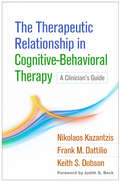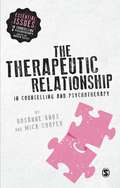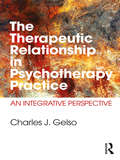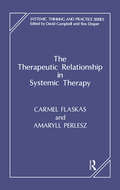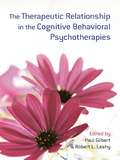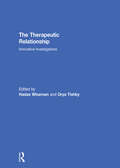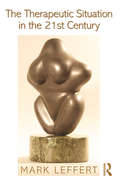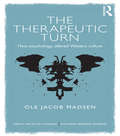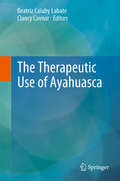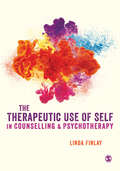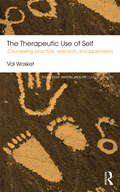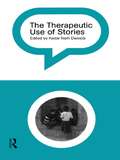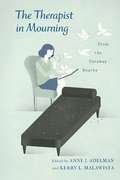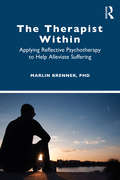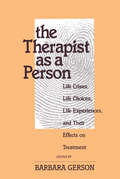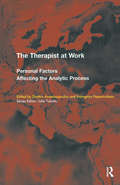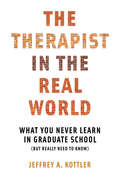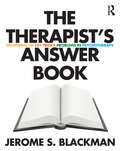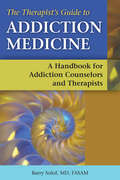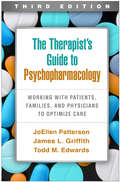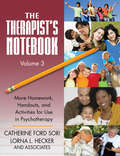- Table View
- List View
The Therapeutic Relationship in Cognitive-Behavioral Therapy: A Clinician's Guide
by Judith S. Beck Nikolaos Kazantzis Frank M. Dattilio Keith S. DobsonFrom leading cognitive-behavioral therapy (CBT) experts, this book describes ways to tailor empirically supported relationship factors that can strengthen collaboration, empiricism, and Socratic dialogue and improve outcomes. In an accessible style, it provides practical clinical recommendations accompanied by rich case examples and self-reflection exercises. The book shows how to use a strong case conceptualization to decide when to target relationship issues, what specific strategies to use (for example, expressing empathy or requesting client feedback), and how to navigate the therapist's own emotional responses in session. Special topics include enhancing the therapeutic relationship with couples, families, groups, and children and adolescents. Reproducible worksheets can be downloaded and printed in a convenient 8 1/2" x 11" size.
The Therapeutic Relationship in Counselling and Psychotherapy (Essential Issues in Counselling and Psychotherapy - Andrew Reeves)
by Mick Cooper Rosanne KnoxWhat is a therapeutic alliance? How do I create a bond? What might lead to the alliance breaking down? What do I do when the relationship feels stuck? These are just some of the questions addressed in this important new book for trainee and qualified therapists wanting to understand, engage in and make the most of the therapeutic relationship. Taking you through each stage of the therapeutic process, from initial boundary setting to effective endings, the book considers a number of different settings and client groups such as working in an online environment and with children and young people. Structured around ‘Frequently Asked Questions’, an accessible and engaging narrative guides you though the skills and considerations for an effective therapeutic relationship, as well as the potential challenges it might face. Bringing to the forefront the mutuality of the relationship and the client as a proactive agent, this book will equip you with the knowledge and skills needed to develop trusting and productive relationships with your clients.
The Therapeutic Relationship in Counselling and Psychotherapy (Essential Issues in Counselling and Psychotherapy - Andrew Reeves)
by Professor Mick Cooper Rosanne KnoxUnravelling the issues surrounding the therapeutic relationship, this book highlights the importance of the relationship itself, of the client as a proactive agent in the process, and of the need for partnership and collaboration for effective therapy to take place. It will provide trainees and newly qualified therapists with the knowledge and skills they need to practice on a level of deep understanding and confidence.
The Therapeutic Relationship in Psychotherapy Practice: An Integrative Perspective
by Charles J. GelsoThe Therapeutic Relationship in Psychotherapy Practice: An Integrative Perspective explores the key components of the patient–therapist relationship in psychotherapy, as well as how these elements affect the treatment process and outcomes and what therapists may do to enhance the relationship. Dr. Gelso posits a tripartite model in which the therapeutic relationship is seen as being composed of three interlocking elements: a real or personal relationship, a working alliance, and a transference–countertransference configuration that exist in each and every therapeutic relationship. Focusing on what psychotherapists can do to foster strong and facilitative relationships with their patients, the book includes substantial material drawn from clinical practice, with an ever-present eye on research findings.
The Therapeutic Relationship in Systemic Therapy (The Systemic Thinking and Practice Series)
by Carmel Flaskas Amaryll Perlesz Eleanor S. WertheimAnyone following the recent developments of systemic thinking will be aware that activity has not been restricted to Europe and America. Systemic therapists and writers from both Australia and New Zealand are now making a major impact on the field, particularly in the way they explore therapy as an exchange between “real” people; with gender and with ethical values; and embedded within specific cultural experiences. These people are challenging the traditional way we see clients and the context of therapy. Over the years, systemic? therapists have theorized extensively about the client family as a system and have more recently addressed the use of self in therapy, but there has been very little attention paid to the therapeutic relationship between the two.
The Therapeutic Relationship in the Cognitive Behavioral Psychotherapies
by Robert L. Leahy Paul GilbertAlthough the therapeutic relationship is a major contributor to therapeutic outcomes, the cognitive behavioral psychotherapies have not explored this aspect in any detail. This book addresses this shortfall and explores the therapeutic relationship from a range of different perspectives within cognitive behavioral and emotion focused therapy traditions. The Therapeutic Relationship in the Cognitive Behavioral Psychotherapies covers new research on basic models of the process of the therapeutic relationship, and explores key issues related to developing emotional sensitivity, empathic understanding, mindfulness, compassion and validation within the therapeutic relationship. The contributors draw on their extensive experience in different schools of cognitive behavioral therapy to address their understanding and use of the therapeutic relationship. Subjects covered include: · the process and changing nature of the therapeutic relationship over time · recognizing and resolving ruptures in the therapeutic alliance · the role of evolved social needs and compassion in the therapeutic relationship · the therapeutic relationship with difficult to engage clients · self and self-reflection in the therapeutic relationship. This book will be of great interest to all psychotherapists who want to deepen their understanding of the therapeutic relationship, especially those who wish to follow cognitive behavioral approaches.
The Therapeutic Relationship: Innovative Investigations
by Hadas Wiseman and Orya TishbyThe therapeutic relationship has been recognized by psychotherapy researchers and clinicians alike as playing a central role in the process and outcome of psychotherapy. This book presents innovative investigations of the therapeutic relationship focusing on various relationship mechanisms as they relate to changing processes and outcomes. A variety of perspectives on the therapeutic relationship are provided through different research methods, including quantitative and qualitative methods, and divergence in psychotherapy orientations, including psychodynamic, interpersonal, cognitive-behavioural therapy, emotion-focused process experiential therapy, narrative therapy, and attachment-based family therapy. The chapters, written by leading psychotherapy researchers, present cutting-edge empirical studies that apply innovative methods in order to: study process-outcome links; explore in session processes that address the question of how the therapeutic relationship heals; examine the contributions of clients and therapists to the therapeutic relationship; and suggest practical implications for training therapists in psychotherapy relationships that work. Research on the therapeutic relationship has been identified as a natural arena for bridging the gap between research and clinical practice, and will be of particular interest to practicing clinicians. This book was originally published as a special issue of Psychotherapy Research.
The Therapeutic Situation in the 21st Century
by Mark LeffertExtending the themes of Contemporary Psychoanalytic Foundations, The Therapeutic Situation in the 21st Century is a systematic reformulation of fundamental psychoanalytic concepts, such as transference, therapeutic action, and the uses of psychotropic drugs, in the light of recent developments in postmodernism, complexity theory, and neuroscience. Leffert offers formulations of areas not previously considered in any depth by psychoanalysts, such as power relations in the analytic couple, social matrix theory, and narrative theory informed by considerations of archaeology, genealogy, complexity, memory, and recall. He also considers new areas, such as the role of uncertainty and love in the therapeutic situation. This book is part of an ongoing effort to place psychoanalysis in the current century, and looks to outside as well as inside areas of thought to inform how we work and how we think about our work.
The Therapeutic Turn: How psychology altered Western culture (Concepts for Critical Psychology)
by Ole Jacob MadsenIn what ways has psychology become more influential in Western society? In this book author Ole Jacob Madsen considers the notion of a ‘Therapeutic Turn’ in Western culture – the tendency for psychology to permeate ever new spheres within society. The Therapeutic Turn evaluates the increasing prevalence of psychology in several areas of Western society: Western consumer culture, contemporary Christianity, self-help, sport and politics. Madsen proposes that there are problematic aspects to this development which are seldom recognised due to a widely held assumption that ‘the more psychology, the better for everyone’. A recurring concern with psychological solutions is that they often provide individual solutions to structural problems. As a result, psychologists may be inadvertently increasing the burden on the shoulders of the people they are meant to help and, at the same time, our capacity to understand individual suffering in the light of major historical and political changes in society is becoming increasingly clouded. The Therapeutic Turn presents an accessible and engaging critique of the influence of psychology within Western society. It will appeal to a broad audience of students, academics and lay readers interested in this aspect of modernity and contemporary society, and it will also be of great interest to practitioners and therapists.
The Therapeutic Use of Ayahuasca
by Beatriz Caiuby Labate Clancy CavnarThis book presents a series of perspectives on the therapeutic potential of the ritual and clinical use of the Amazonian hallucinogenic brew ayahuasca in the treatment and management of various diseases and ailments, especially its role in psychological well-being and substance dependence. Biomedical and anthropological data on the use of ayahuasca for treating depression, PTSD, and substance dependence in different settings, such as indigenous contexts, neo-shamanic rituals, contemporary therapeutic circles, and in ayahuasca religions, in both South and North America, are presented and critiqued. Though multiple anecdotal reports on the therapeutic use of ayahuasca exist, there has been no systematic and dense reflection on the topic thus far. The book brings the therapeutic use of ayahuasca to a new level of public examination and academic debate. The texts in this volume stimulate discussion on methodological, ethical, and political aspects of research and will enhance the development of this emergent field of studies.
The Therapeutic Use of Ayahuasca
by Beatriz Caiuby Labate Clancy CavnarThis book presents a series of perspectives on the therapeutic potential of the ritual and clinical use of the Amazonian hallucinogenic brew ayahuasca in the treatment and management of various diseases and ailments, especially its role in psychological well-being and substance dependence. Biomedical and anthropological data on the use of ayahuasca for treating depression, PTSD, and substance dependence in different settings, such as indigenous contexts, neo-shamanic rituals, contemporary therapeutic circles, and in ayahuasca religions, in both South and North America, are presented and critiqued. Though multiple anecdotal reports on the therapeutic use of ayahuasca exist, there has been no systematic and dense reflection on the topic thus far. The book brings the therapeutic use of ayahuasca to a new level of public examination and academic debate. The texts in this volume stimulate discussion on methodological, ethical, and political aspects of research and will enhance the development of this emergent field of studies.
The Therapeutic Use of Self in Counselling and Psychotherapy
by Linda FinlayThis book examines the ‘therapeutic use of self’, and the intertwining of the therapist’s professional self and their personal self. Combining practical illustrations and case studies with theory and research, the book explores a number of questions, such as: · What are our personal values and attitudes and how do these manifest in our work with clients? · How do we interact with and impact others, and in what ways might this help or hinder our therapeutic work? · What might we represent to the client as a result of our particular social background, and how might this impact on the power dynamics within client relationships? Learning features include Practical Applications, Research boxes, Case Examples, Critical Reflections, Discussion Questions and Further Reading. This is a must-read for any students studying professional practice, counselling process, ethics, skills, working online/remotely, the therapeutic relationship, and more.
The Therapeutic Use of Self in Counselling and Psychotherapy
by Linda FinlayThis book examines the ‘therapeutic use of self’, and the intertwining of the therapist’s professional self and their personal self. Combining practical illustrations and case studies with theory and research, the book explores a number of questions, such as: · What are our personal values and attitudes and how do these manifest in our work with clients? · How do we interact with and impact others, and in what ways might this help or hinder our therapeutic work? · What might we represent to the client as a result of our particular social background, and how might this impact on the power dynamics within client relationships? Learning features include Practical Applications, Research boxes, Case Examples, Critical Reflections, Discussion Questions and Further Reading. This is a must-read for any students studying professional practice, counselling process, ethics, skills, working online/remotely, the therapeutic relationship, and more.
The Therapeutic Use of Self: Counselling practice, research and supervision (Routledge Mental Health Classic Editions)
by Val WosketThe Therapeutic Use of Self has continued, since its publication in 1999, to be considered a key text within integrative, humanistic and relational approaches for the training and development of therapists in the UK and abroad. This long-awaited classic edition includes powerful case examples and extensive research findings, presenting the counsellor’s evaluation of their own practice as the main vehicle for the development of insight and awareness into individual ‘therapeutic’ characteristics. The book addresses many of the taboos and infrequently discussed aspects of therapy, such as: The value of therapist failure Breaking the rules of counselling Working beyond the accepted boundaries of counselling. The Therapeutic Use of Self will help professionals and trainees acknowledge, develop and value their own unique contribution to counselling and psychotherapy. The book remains a ground-breaking examination of the individual therapist’s contribution to process and outcome in counselling and supervision.
The Therapeutic Use of Stories
by Kedar Nath DwivediThe potential for healing available in well-known myths and stories is increasingly recognized, but many practitioners are unsure how to tap into this rich and often culturally-specific source of insight. What sort of story is best for what sort of situation? How can it be introduced naturally into the session? What is the best way of using the story? These are some of the questions contributors to this book set out to answer. They explore the historical and cultural context of story-telling and provide examples of specific stories for specific situations. Covering emotional themes such as anger, anxiety, fear, shame, guilt, separation and bereavement, the authors show how they work through stories with many different kinds of client groups and individuals of all ages in educational, health and social science settings. The Therapeutic Use of Stories provides a sound theoretical framework for the use of stories, examples of stories with a high therapeutic value, and practical advice on how to use them to best effect.
The Therapist In Mourning
by Anne J. Adelman Kerry L. MalawistaThe unexpected loss of a client can be a lonely and isolating experience for therapists. While family and friends can ritually mourn the deceased, the nature of the therapeutic relationship prohibits therapists from engaging in such activities. Practitioners can only share memories of a client in circumscribed ways, while respecting the patient's confidentiality. Therefore, they may find it difficult to discuss the things that made the therapeutic relationship meaningful. Similarly, when a therapist loses someone in their private lives, they are expected to isolate themselves from grief, since allowing one's personal life to enter the working relationship can interfere with a client's self-discovery and healing. For therapists caught between their grief and the empathy they provide for their clients, this collection explores the complexity of bereavement within the practice setting. It also examines the professional and personal ramifications of death and loss for the practicing clinician. Featuring original essays from longstanding practitioners, the collection demonstrates the universal experience of bereavement while outlining a theoretical framework for the position of the bereft therapist. Essays cover the unexpected death of clients and patient suicide, personal loss in a therapist's life, the grief of clients who lose a therapist, disastrous loss within a community, and the grief resulting from professional losses and disruptions. The first of its kind, this volume gives voice to long-suppressed thoughts and emotions, enabling psychologists, psychiatrists, counselors, and other mental health specialists to achieve the connection and healing they bring to their own work.
The Therapist Within: Applying Reflective Psychotherapy to Help Alleviate Suffering
by Marlin BrennerThe Therapist Within introduces an original, systematic approach for understanding and treating suffering clients through reflective processes, providing readers with the essential tools needed to alleviate their own personal suffering and live a fuller, more enjoyable life. Developed from knowledge gleaned from his five decades of clinical work and his own journey with anxiety, isolation, and despair, Dr. Brenner’s novel reflective psychotherapy is influenced by psychoanalytic psychotherapy, relational therapy, and psychodynamic psychotherapy. Advancing this innovative therapeutic method, the book provides a strong framework for guiding clients through the process of reflecting upon and re-encountering their life history, consciousness, inner and outer worldview, intrapersonal dynamics, and relationships, as well as for applying specific methods of intervention. Rejecting conventional approaches to therapy, this book provides therapists with a holistic treatment plan to use with clients and will teach all readers to use self-reflection, meditation, and journal writing to achieve a greater sense of well-being and psychological strength.
The Therapist as a Person: Life Crises, Life Choices, Life Experiences, and Their Effects on Treatment (Relational Perspectives Book Series #6)
by Barbara GersonIn this collection of powerfully illuminating and often poignant essays, contributors candidly discuss the impact of central life crises and identity concerns on their work as therapists. With chapters focusing on identity concerns associated with the body-self (body size, ethnicity, sexual orientation, and age), urgent life crises, and defining life circumstances, The Therapist as a Person exemplifies the myriad ways in which the therapist's subjectivity shapes his or her interaction with patients. Included in the collection are life events rarely if ever dealt with in the literature: the death of family members, late pregnancy loss, divorce, the failure of the therapist's own therapy, infertility and childlessness, the decision to adopt a child, and the parenting of a profoundly deaf child.
The Therapist at Work: Personal Factors Affecting the Analytic Process (The\efpp Monograph Ser.)
by Paul Williams Dimitris Anastasopoulos Evagelos PapanicolaouDimitris Anastasopoulos and Evangelos Papanicolaou have gathered together a distinguished group of contributors to focus on the therapist's participation in therapy and the influence of personal factors on the therapeutic relationship. The majority of the papers grew out of the proceedings of the fourth EFPP Congress of the Adults Section in 2000 and explore the therapist-patient relationship with the emphasis on the influence of the therapist as opposed to that of the patient. Topics discussed in this collection include the impact of the patient on the analyst, how the analyst's clinical theory and personal philosophy affect the analytic process, the effect of the therapist's dreams on the therapeutic process, the psychoanalyst's influence on the collaborative process, and intersubjective phenomena and emotional exchange in the psychoanalytic process. Certain papers focus mainly on theory while others are more clinically-oriented. This volume presents an overview of historic and current thinking and aims to generate yet more discussion on this evolving and important issue. It will be of interest to practicing and training psychotherapists.
The Therapist in Mourning: From the Faraway Nearby
by Anne J. Adelman Kerry L. MalawistaThe unexpected loss of a client can be a lonely and isolating experience for therapists. While family and friends can ritually mourn the deceased, the nature of the therapeutic relationship prohibits therapists from engaging in such activities. Practitioners can only share memories of a client in circumscribed ways, while respecting the patient's confidentiality. Therefore, they may find it difficult to discuss the things that made the therapeutic relationship meaningful. Similarly, when a therapist loses someone in their private lives, they are expected to isolate themselves from grief, since allowing one's personal life to enter the working relationship can interfere with a client's self-discovery and healing. For therapists caught between their grief and the empathy they provide for their clients, this collection explores the complexity of bereavement within the practice setting. It also examines the professional and personal ramifications of death and loss for the practicing clinician. Featuring original essays from longstanding practitioners, the collection demonstrates the universal experience of bereavement while outlining a theoretical framework for the position of the bereft therapist. Essays cover the unexpected death of clients and patient suicide, personal loss in a therapist's life, the grief of clients who lose a therapist, disastrous loss within a community, and the grief resulting from professional losses and disruptions. The first of its kind, this volume gives voice to long-suppressed thoughts and emotions, enabling psychologists, psychiatrists, counselors, and other mental health specialists to achieve the connection and healing they bring to their own work.
The Therapist in the Real World: What You Never Learn in Graduate School (But Really Need to Know)
by Jeffrey A. KottlerAdvice and inspiration for the real-life challenges of being a mental health professional. Graduate school and professional training for therapists often focus on academic preparation, but there's a lot more that a therapist needs to know to be successful after graduation. With warmth, wisdom, and expertise, Jeffrey A. Kottler covers crucial but underaddressed challenges that therapists face in their professional lives at all levels of experience. PART I , "More Than You Bargained For," covers the changing landscape of the mental health profession and the limits and merits of professional training. PART II , "Secrets and Neglected Challenges," explores important issues that are often overlooked during training years, including the ways our clients become our greatest teachers, the power of storytelling, and the role of deception in psychotherapy. And in PART III , "Ongoing Personal and Professional Development," Kottler focuses on areas in which even the most experienced therapists can continue to hone their talents and maximize their potential, laying out effective tips to navigate organization politics, write and publish books and articles, cultivate creativity in clinical work, maintain a private practice, present and lecture to large and small audiences, sustain passion for the work of helping others, plan for the future, and much more. As honest and inspiring as it is revealing, this book offers therapists and counselors at all levels of experience key ideas for thriving after formal education.
The Therapist's Answer Book: Solutions to 101 Tricky Problems in Psychotherapy
by Jerome S. BlackmanTherapists inevitably feel more gratified in their work when their cases have better treatment outcomes. This book is designed to help them achieve that by providing practical solutions to problems that arise in psychotherapy, such as: Do depressed people need an antidepressant, or psychotherapy alone? How do you handle people who want to be your “friend,” who touch you, who won’t leave your office, or who break boundaries? How do you prevent people from quitting treatment prematurely? Suppose you don’t like the person who consults you? What if people you treat with CBT don’t do their homework? When do you explain defense mechanisms, and when do you use supportive approaches? Award-winning professor, Jerome Blackman, answers these and many other tricky problems for psychotherapists. Dr. Blackman punctuates his lively text with tips and snippets of various theories that apply to psychotherapy. He shares his advice and illustrates his successes and failures in diagnosis, treatment, and supervision. He highlights fundamental, fascinating, and perplexing problems he has encountered over decades of practicing and supervising therapy.
The Therapist's Guide to Addiction Medicine
by Barry SolofThis book spotlights the essential biological and medical knowledge that a therapist or counselor must have in order to work effectively in addiction treatment. The author uses his expertise, developed over thirty-five years of addiction medicine practice, to give therapists and counselors the information and tools needed to help their clients recover from addiction, a chronic, progressive, and incurable disease.
The Therapist's Guide to Psychopharmacology, Third Edition: Working with Patients, Families, and Physicians to Optimize Care
by James L. Griffith Todd M. Edwards JoEllen PattersonNow in a revised and updated third edition, this noted practitioner guide and text incorporates the latest knowledge about psychopharmacology and collaborative care. Therapists and counselors learn when and how to make medication referrals and how to address patients' questions about drug benefits, side effects, safety, and more. Organized around frequently encountered mental health disorders, the book explains how medications work (including what they can and cannot accomplish). Strategies for collaborating successfully with patients, their family members, and prescribers are discussed in detail. Written for optimal practical utility, the text features case examples, sample referral letters, checklists, and a glossary. New to This Edition *Chapter on the therapeutic relationship. *New separate chapter on bipolar disorder. *Expanded discussions of distinguishing psychiatric illness from normal distress, optimizing collaboration with psychiatrists, how medications work in the brain, treatment of chronic pain, and more. *Additional case vignettes and psychopharmacology "rules of thumb."
The Therapist's Notebook Volume 3: More Homework, Handouts, and Activities for Use in Psychotherapy
by Lorna L. Hecker Catherine Ford SoriThe Therapist's Notebook Volume 3 includes clinician field-tested activities for therapists who work with individuals, children and adolescents, couples, families, and groups. The reproducible handouts are designed to be practical and useful for the clinician, and cover the most salient topics that counselors are likely to encounter in their practices, with various theoretical approaches. Each chapter includes a "Reading and Resources for the Professional" section that guides readers toward useful books, videos, or websites that will further enhance their understanding of the chapter contents. This book is an excellent tool for both experienced and novice counselors for increasing therapeutic effectiveness.
